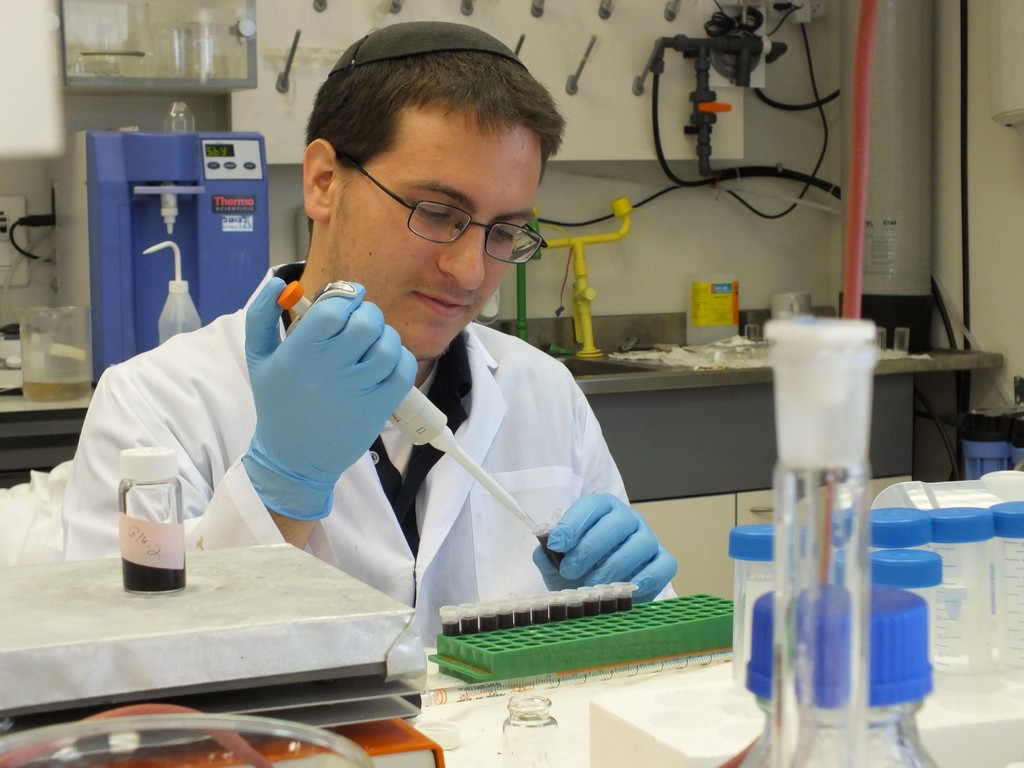Local students in hi-tech YU-Bar Ilan internship
Yeshiva and Bar-Ilan Universities formed “a good shidduch” (match) for the third time this summer, with 28 YU students working with some of Israel’s top scientists at Bar-Ilan University in Israel.
“YU has bright students who could benefit from the research experience,” said the program’s founder, Chaim Sukenik, a YU alumnus who is a professor of chemistry at Bar-Ilan’s Institute of Nanotechnology.
He also saw this as a hakarat hatov (show of gratitude) by Bar-Ilan to YU. He said almost all of the students in the program had been in Israel “for a year or two and had enthusiasm for Israel but their perspective didn’t include the academic or hi-tech side of what Israel is all about.”
Sukenik’s program concentrates in areas where YU doesn’t have graduate programs — chemistry, physics, engineering, and in which “Bar-Ilan had just made massive investment” in infrastructure.
David Kornbluth, a Cedarhurst resident who is a graduate of Rambam Mesivta in Lawrence, was one of the participants. He learned a year in Yeshivat Sha’alvim and is entering his fourth year at YU as a physics major. He hopes to be an engineer.
“The BIU-YU research program is a win-win for me, I like science and I love Israel, and engineering in Israel is not such a bad idea. I’m not on this program simply because it’s a prestigious research opportunity but because it’s a prestigious research opportunity in Israel. This program gives me the chance to do what I love where I would love to do it. The work that I’m doing is really interesting. My lab deals with nanotechnology.”
His project involves using gold nanoparticles to more easily see tumors on CT scans.
“These ideas were all science fiction just a few years ago,” Kornbluth said. “My favorite part of the program is interacting with all the different people in my lab. There are so many people here with starkly different backgrounds yet they all work together as a team. It’s really something to see.”
One day each week, the students visited a research facility or a high-tech company, a hospital or government lab, such as Tel Hashomer hospital, Teva Pharmaceuticals, Elbit, Intel, and Israel Aircraft.
The students —men and women with two years of college level science courses behind them — worked in BIU labs in Givat Shmuel and commuted daily to separate men and women dorms in the Gruss building, YU’s Israel facility, in Jerusalem. They were supervised there by an Av and Em Habayit (house father and mother) who provide voluntary supplementary programs in the evening such as Torah classes.
YU pays one third of the budget and Bar Ilan covers two-thirds of the cost. Students pay for their own plane ticket and any other incidental expenses.
The dorm, breakfast and dinner, and transportation to and from the lab and trips, and two Shabbatonim are included in the cost of the program.
“The program reflects the religious values of Bar Ilan and YU,” stressed Sukenik. He noted that many learn in the Beit Medrash (house of study) every night and participated in a daf yomi shiur on the three hour round trip bus ride each day, including the women. The program “encourages students to think about graduate opportunities in Israel,” Sukenik said. “It gives them an opportunity to think about things that they might not have considered, as a place to go to medical or graduate school or a place to live.”
Miriam Andrusier, a graduate of Bnos Menachem High School in Crown Heights, joined the program because of her love of science, specifically biology. She studied for a year in Chaya Mushka Seminary in Tzfat and plans to study medicine, preferably at an American program in Israel.
“I applied to this program because it combines my two favorite things — science and Israel,” she explained. She said she learned basic techniques from the molecular biology lab at Stern College, “However, I am still learning many, many interesting things and techniques like genetic engineering and cloning! Every day is so productive and lots of fun. I also like to see how so many different types of Jews can all pursue their passions and also raise a family.”
Applications for the coming year are accepted from November through January and students find out about acceptance in March.

 50.0°,
Overcast
50.0°,
Overcast 




